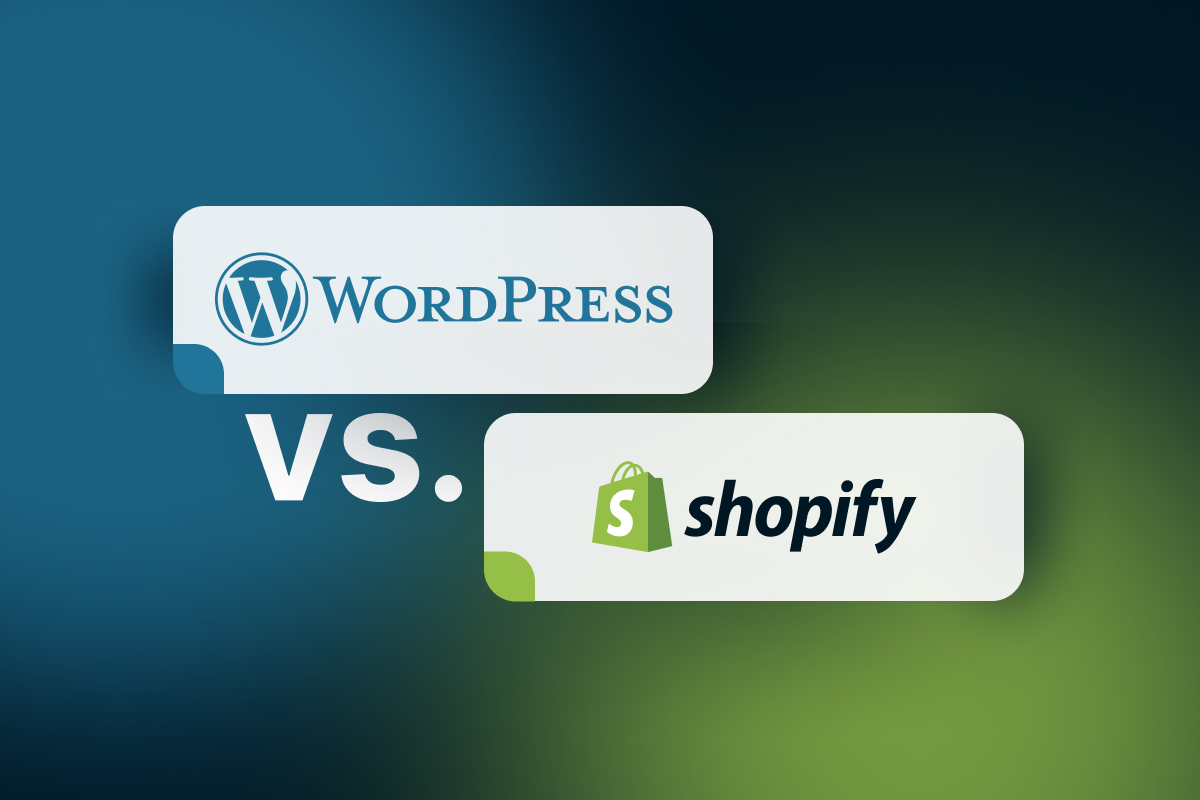Table of Contents
Being the 2 most popular eCommerce platforms on the market, the battle between Shopify vs WordPress is tough, and it can be overwhelming to figure out which is best for your business. Each platform has its unique features and benefits, making it difficult to determine which one to use.
However, fear not! In this article, we’ll dive into the details of Shopify and WordPress, comparing their features, pricing and many other aspects to help you make wiser decisions. So, grab a cup of coffee and get ready to explore the world of eCommerce platforms.
| Recommended reading: |
Shopify vs WordPress: General Information
1. What is Shopify?
Shopify is a powerful and user-friendly e-commerce platform that allows businesses to create, run and manage their online store, sell products, connect with customers and make money.
Shopify is a SaaS, meaning that you pay a monthly subscription price rather than buying the program outright. Since it is hosted in the cloud, you only need a computer with internet access and a web browser to run your business. You can construct and manage your online store with ease, and if you need anything else, you can get it in the Shopify App Store.

The nicest feature of Shopify is that it allows you to open a store without needing any design or programming knowledge. Even if you don’t know how to code, you can create your own store from the ground up. However, if you have experience with HTML and CSS, you can make more extensive changes to your store.
| Learn more about Shopify here: |
2. What is WordPress?
There are actually 2 versions of WordPress, namely:
WordPress.com is a website builder that specializes in blog creation. For a set monthly subscription, you gain access to a suite of tools that facilitate the development and upkeep of your website. However, integrating eCommerce functionality calls for additional software.
Fun fact, there are over 30% of all websites run on WordPress.org, and because it’s open-source, anyone can access and modify the code.
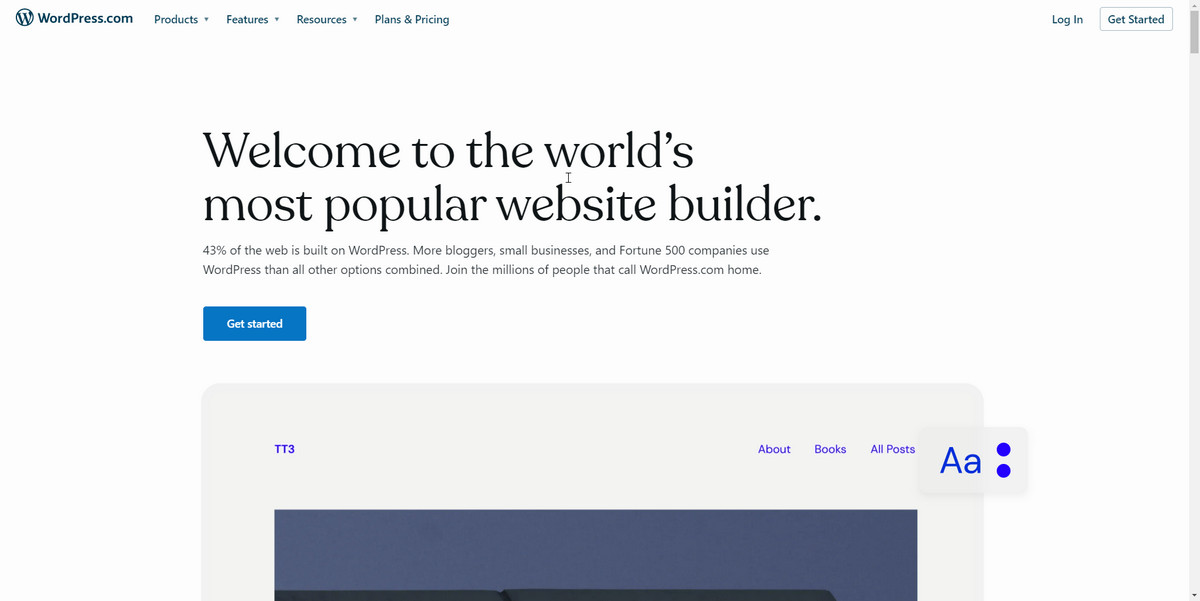
WordPress.org, on the other hand, is a self-hosted platform that has advanced features. This WordPress version’s flexibility makes it a formidable competitor to Shopify; it can be used to build virtually any kind of website, including e-commerce websites.
With the correct website designers and helpful plugins, WordPress.org is a highly adaptable tool that can fulfill the needs of any web design project.
With that being said, in this article, we will compare Shopify with WordPress.com in particular.
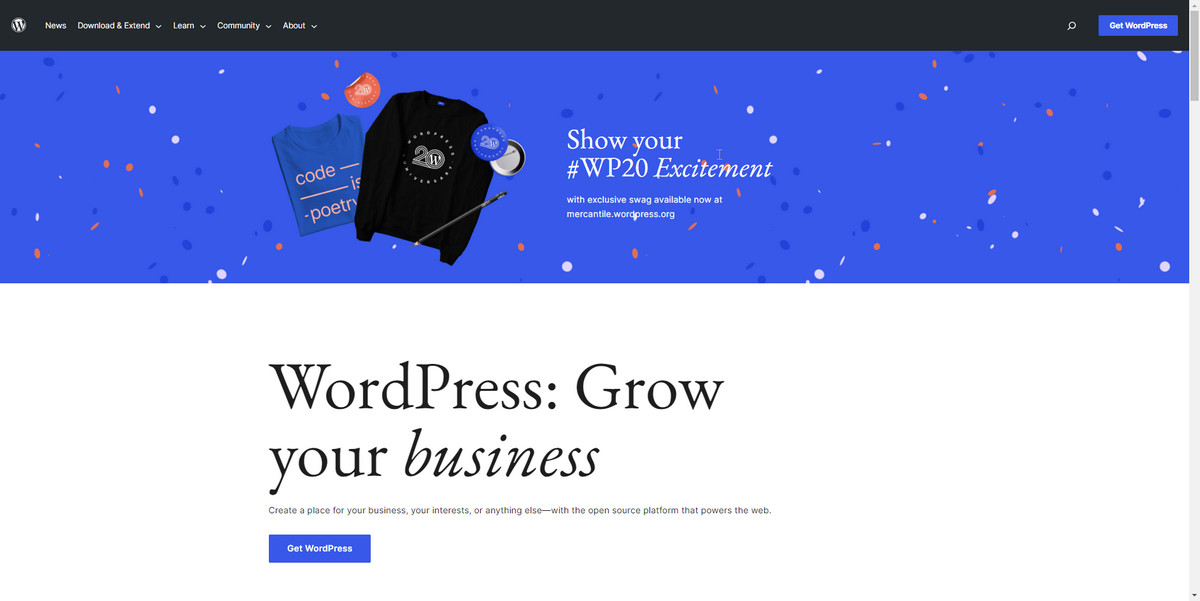
Shopify vs WordPress: Pros and Cons
Now you’ve the idea of what Shopify and WordPress is. In the next section we will analyze and put into comparison the pros and cons of these two potent e-commerce platforms.
1. Shopify pros & cons
Shopify is an excellent option for building and running an online store, but like any solution, it has its pros and cons.
One of the most significant advantages of Shopify is that you don’t need any coding or technical knowledge to use it. This means that anyone can start their online store, regardless of their skillset.
Additionally, you don’t have to worry about hosting or external security, as Shopify takes care of everything for you. Moreover, since Shopify is purposely built for eCommerce websites, it provides all the necessary tools for sales, product management, and legal documents.
Furthermore, Shopify has excellent customer support, available 24/7 to help you with any problems you might face.
However, Shopify has its drawbacks too. One of the major drawbacks is the extra transaction fees if you don’t use its native payment processor – Shopify Payment. Shopify charges between 0.5 – 5% per transaction, which can add up to significant costs, especially for small businesses.
Additionally, since Shopify has many tools, it is not quite basic or super simple to use. You still need some time to get used to using the dashboard.
In addition to these, it has a number of other benefits that have made it the go-to choice for online retailers. A summary table of these features can be found below.
| Pros | Cons |
|
|
2. WordPress pros & cons
WordPress is a popular platform that offers many advantages to users. One of the most significant advantages of WordPress is its power and flexibility. With WordPress, users can customize their website to their liking, including design, functionality, and features.
Moreover, WordPress also has a drag-and-drop website builder called Gutenberg, which is great for blogging websites. Gutenberg allows users to create and manage content easily without the need for technical knowledge or coding skills.
However, WordPress also has its disadvantages. To use WordPress, a decent level of technical knowledge is required from the start, which can be challenging for beginners. Additionally, the cost of using WordPress can add up quickly and get very expensive, especially if users require premium features or services.
Finally, third-party company services are needed for web hosting, domain registration, and security, which can add additional costs and complexity.
Here is a table summary these key points:
| Pros | Cons |
|
|
Shopify vs WordPress: Head-to-head Comparison
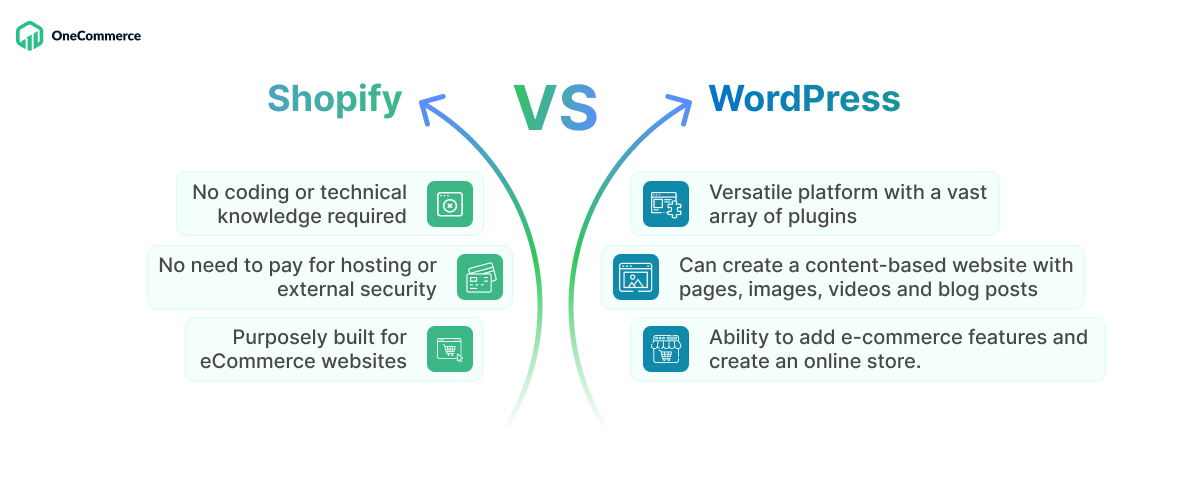
1. Shopify vs WordPress: Pricing
Shopify vs WordPress are two of the most popular platforms for building e-commerce websites. Both have their own advantages and disadvantages and choosing between them depends on your specific needs and requirements.
One of the most significant differences between Shopify and WordPress is their pricing. Shopify offers a 2-day free trial and three main plans, with prices ranging from $39 to $399 per month. They also offer a starter plan and an enterprise-level plan sold on a quote-by-quote basis. If you commit to a longer term, you can save up to 25% on each plan.

For small merchants, Shopify Basic is adequate, while upgrading to the Shopify plan offers detailed reporting and abandoned cart recovery. The Advanced Shopify plan offers advanced reporting and real-time shipping. For most businesses, the Shopify plan at $79 per month offers the best value for money.
On the other hand, WordPress is entirely free to download and use. However, costs can quickly add up once you start building your website. You’ll need to pay for website hosting, WordPress tutorials and courses, themes, plugins, payment software, and more.
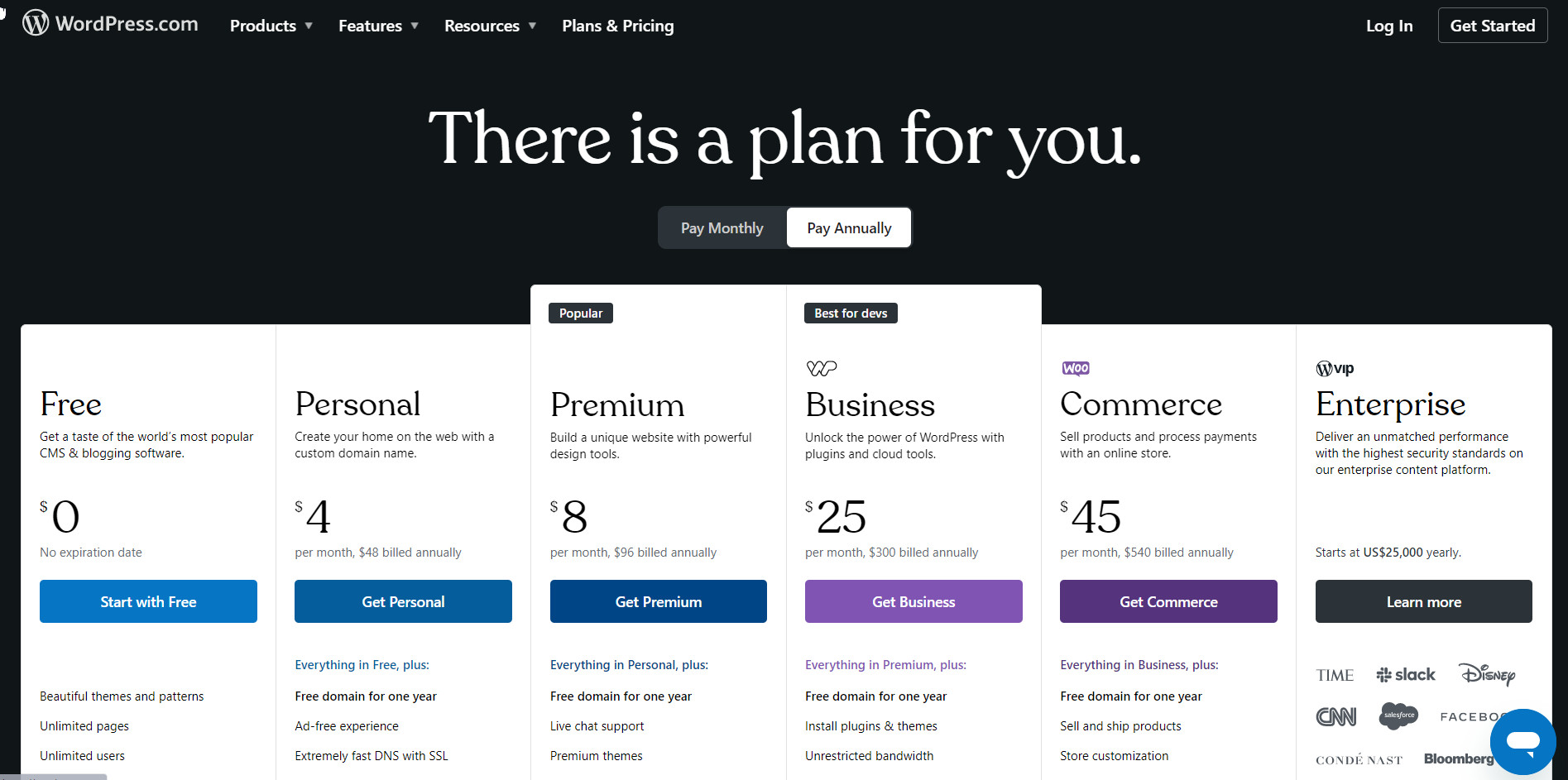
With WordPress, there’s no limit to how much you can spend on your online store, which is why many people prefer it for the freedom of changing and upgrading.
However, you need to consider your budget as costs can quickly add up carefully. WooCommerce – a WordPress e-commerce plugin, for instance, is free to use, but you’ll need to pay for additional features and add-ons.
In terms of pricing, it’s hard to decide the side. Shopify may seem more expensive at first, but everything you need is included in transparent pricing. WordPress appears to be a budget-friendly option, but you must pay for everything, and costs can quickly add up.
- Result: It’s a tie!
2. Shopify vs WordPress: Theme library
WordPress is the clear winner in this round. While Shopify offers a variety of store themes, the options pale in comparison to the WordPress theme universe. There are thousands of ready-to-go free and low-cost WordPress e-commerce store themes, versus Shopify’s hundreds.
Best of all, most WordPress themes can be customized without any coding knowledge using various WordPress pages builders like Beaver Builder, Elementor, and Divi. However, learning how the WordPress dashboard and theme setup tools work can take some time.

WordPress themes
Once you’re comfortable in the WordPress environment, you’ll enjoy far more control over your website’s home page design, header, menus, store pages, and blog layouts. Plus you can add slider and hero elements, grid pages, and video elements anywhere you like within most WordPress online store themes.

shopify themes
Shopify gives you custom options within its theme setting, but you need coding expertise to match the control you get with WordPress. So, to make a truly customized Shopify website, you’ll probably need to hire a pro, which can be costly.
- Result: WordPress Wins!
3. Shopify vs WordPress: Blogging capabilities
When it comes to blogging, WordPress has the upper hand over Shopify. Blogging is a critical aspect of inbound marketing and can drive traffic and sales to your online store. While Shopify has blogging functionality, it’s not as optimized as WordPress.
WordPress allows you to keep an archive of changes to existing posts, create posts with clean and customized URLs, and use categories and tags.
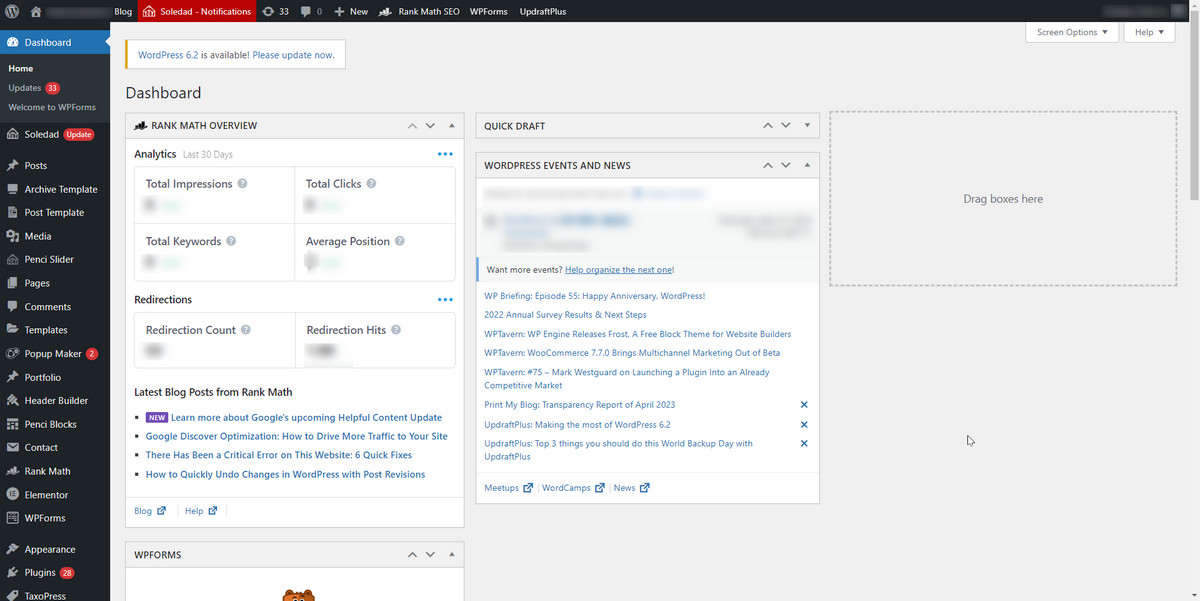
WordPress Blog
On the other hand, Shopify only allows you to use tags and prefixes for blog posts with /posts/ in the name.
It’s not surprising that WordPress excels in this area, given its long history as a professional blogging solution. So, if you’re looking for a platform that provides robust blogging capabilities, WordPress is your choice!
- Result: WordPress Wins!
4. Shopify vs WordPress: SEO capabilities
Search Engine Optimization (SEO) is a crucial aspect of any website, including online stores. It involves making certain changes to your site to increase its visibility on search engines such as Google and Bing.
Shopify offers a variety of SEO features, such as adding specific titles and descriptions to each web page for search result metadata and customizing URLs and site structure. Plus, Shopify sites are designed to be mobile-friendly, which can improve search engine ranking.
On the other hand, WordPress SEO is mostly done through external plugins like Yoast, which is free or $89 for advanced features. While WordPress has plugins that offer comprehensive SEO, installing and configuring them may require extra effort.
Shopify’s built-in SEO capabilities make it more user-friendly and require fewer additional apps or plugins. Comparatively, WordPress may require more investment in plugins to access full SEO capabilities.
- Result: WordPress Wins!
| Pro Tips: Still curious whether Shopify or WordPress is better in terms of SEO? Check out this article on detailed Shopify SEO vs WordPress SEO comparison! |
5. Shopify vs WordPress: Support
When it comes to supporting services, Shopify seems to be the better choice, especially for those who may not have much technical knowledge. With Shopify, you can receive immediate help through phone, email, live chat, and their onsite Help Center.
Plus, if you use their Shopify Plus plan, you can have a dedicated merchant success manager who can provide constant guidance.
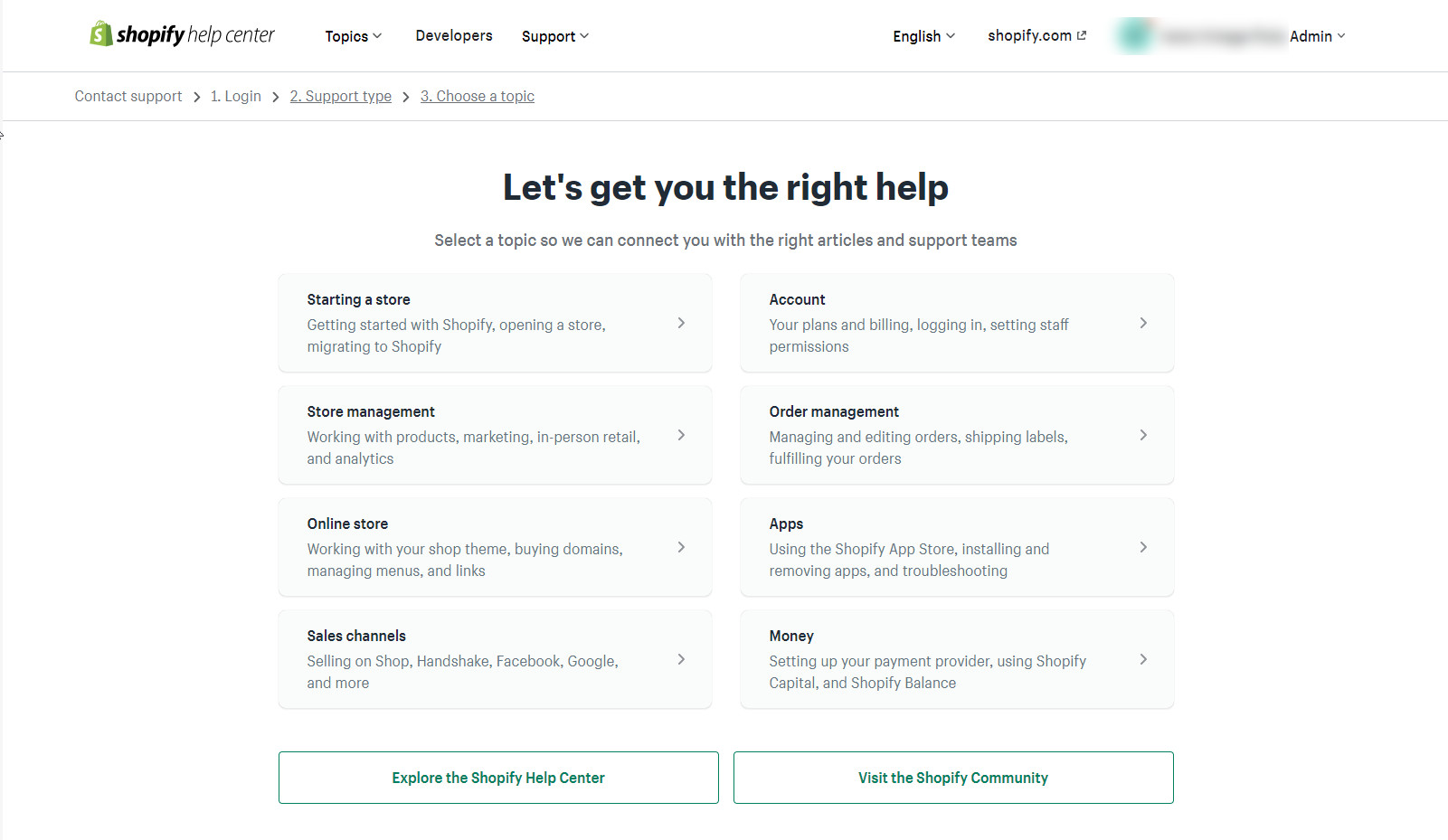
Shopify provides support via various methods
On the other hand, WordPress may be a bit more challenging for those who are not as tech-savvy. While plenty of resources are available in the form of forums and guides, no direct help is available. This means you may need to rely on your own knowledge or the help of friends or employees with technical expertise.
- Result: Shopify Wins!
6. Shopify vs WordPress: Ease of use
Shopify vs WordPress differs significantly from one another in terms of how simple they are to use.
Shopify allows the opening and tailoring of an online shop with zero coding experience. With the platform’s intuitive interface and its wealth of built-in hints and tips, running an online business has never been easier. Adding products is similarly simple, and you can do so either one by one or in mass.
However, WordPress is more involved and requires coding familiarity to operate. It’s also not preconfigured for online sales, so you’ll need to add a plugin to get started. You’ll need to do some homework to select the best e-commerce plugin among the many options out there.
WordPress’s administrative dashboard is where you’ll go to make changes to your site, but the platform’s depth means there are a lot of settings to go through. Adding content and new products is simple, but changing the look of your site can be tricky.
- Result: Shopify Wins!
7. Shopify vs WordPress: Payment options
Both Shopify vs WordPress offers various payment gateway options for accepting payments online, making it a tie in this category. Shopify supports over 100 payment gateways, including popular options like PayPal, Stripe, Square, Amazon Pay, and Apple Pay.
However, Shopify adds a per-transaction fee if you don’t use its in-house payment processing solution (the Shopify Payments), you could be charged between 0.5% to 2% per transaction, depending on your Shopify pricing plan.
Thus, although Shopify Payments is competitively priced compared to PayPal and Stripe, it can be inconvenient to be charged an additional fee for not using it.
WordPress, on the other hand, offers payment gateway options depending on the e-commerce plugin you choose. WooCommerce, Ecwid, and WP eCommerce offer support for most major payment gateways, and you won’t be charged anything beyond each gateway’s transaction fee.
However, at the end of the day, it’s important to present your customers with the most popular payment options, as this could be the difference between making a sale or not.
- Result: It’s a tie!
8. Shopify vs WordPress: Build time
When it comes to building and managing your online store, both Shopify vs WordPress offer tools to help you keep your website running smoothly. However, there are some differences between the two platforms.
One advantage of using Shopify is that routine updates are automated, and you don’t need to worry about managing them yourself. WordPress, however, requires more attention to ensure that all of your software, themes, and plugins are up-to-date. To simplify the process, it’s recommended to use a hosting provider that offers one-click installs and automated daily updates.
Another advantage of using Shopify is that it includes an SSL certificate in each plan, protecting your site and visitors’ data.
With WordPress, you’ll need to research and pay for an SSL certificate separately.
Shopify’s back-end management system is designed for small business convenience, allowing you to automate many order processing tasks such as shipping label printing and order routing.
Depending on your plan, you can also update and unify inventory counts across all sales channels and track performance on various reports. Shopify provides a mobile app and built-in virtual assistant to manage your store on the go.
WooCommerce, on the other hand, also offers many built-in tools including shipping label printing, inventory tracking, and order routing. However, getting everything right may take some add-ons or third-party plugins. Lighter-weight cart plugins have fewer back-end management tools since they’re not geared for volume sellers.
- Result: It’s a tie!
Shopify vs. WordPress: What should you choose?
Shopify vs WordPress are two heavyweight web-building platforms, each with its own strengths and weaknesses.
Shopify is a popular e-commerce builder designed to create online stores. It is user-friendly and does not require coding knowledge, making it ideal for beginners and time-pressed startups. With three main monthly pricing plans starting at $29, Shopify is a convenient and affordable option for building an online store.
On the other hand, WordPress is a free platform but requires hosting and premium themes or plugins to be purchased separately. However, it offers complete flexibility and control over your online store, making it ideal for ambitious and tech-savvy sellers who have some coding knowledge.
While Shopify focuses on e-commerce, WordPress can be used for a range of websites, including e-commerce stores with the addition of the WooCommerce plugin. This flexibility allows for greater customization but also requires more time and effort to set up and maintain.
Reasons to choose Shopify
Consider using Shopify instead of WordPress if:
- You don’t have technical knowledge or coding experience: Shopify doesn’t require any coding knowledge or technical expertise to get started, which makes it a great choice for beginners who want to create their own online store without the hassle of learning how to code.
- You want a platform with built-in features for managing your online store: Shopify has a wide range of built-in features that are specifically designed for managing an online store, including inventory management, order tracking, and customer support tools.
- You don’t want to worry about website maintenance and updates: With Shopify, you don’t need to worry about website maintenance and updates, as everything is taken care of for you. This means you can focus on running your business instead of spending time on technical maintenance tasks.
- You’re willing to pay a monthly fee for a hosted platform with reliable support: Shopify is a hosted platform, which means you pay a monthly fee for the service, but you get reliable support and all the technical aspects of running an online store are taken care of for you. This can be a great option for those who don’t want to deal with the technical side of things and want peace of mind.
Reasons to choose WordPress
Conversely, WordPress is a great option for those who have more technical experience and want complete control over their online store. Here are some specific situations where WordPress might be a better choice than Shopify:
- You want complete flexibility: WordPress allows for complete customization of your website and store, with the ability to add any feature or functionality through the use of plugins and coding. This can be especially useful for larger stores or those with unique needs.
- You’re comfortable with coding: If you have coding experience or are willing to learn, WordPress can be a powerful platform for creating an online store that is tailored to your specific needs. This can be especially useful for those with a technical background who want full control over their store.
- You want to keep costs low: WordPress is free to use, and while you will need to pay for hosting, you can often find affordable options. Additionally, many of the plugins and themes for WordPress are available for free or at a low cost, making it a budget-friendly option for those who are willing to put in the time and effort to set it up.
- You want to sell digital products: While Shopify is great for physical products, WordPress is a better option for selling digital products like e-books, courses, or software. There are a variety of plugins available for WordPress that make it easy to sell and deliver digital products to your customers.
Shopify vs WordPress: FAQs
1. Is Shopify better than WordPress?
It depends on your needs and preferences. Shopify is better for those who want a simple, easy-to-use e-commerce solution with built-in features and reliable support. Whereas, WordPress is better for those who want complete flexibility and control over their website and are willing to invest more time and effort in setup and maintenance.
2. What is the advantage of WordPress over Shopify?
WordPress offers more customization options and flexibility since it is an open-source platform with thousands of plugins and themes available. It also allows you to have complete control over your website’s hosting and maintenance, while Shopify handles these aspects for you.
3. Can Shopify be used with WordPress?
Yes, it is possible to use Shopify with WordPress by integrating the two platforms with a plugin like Shopify’s official plugin or third-party solutions. This allows you to use Shopify for e-commerce functionality while still using WordPress for content management and customization.
4. Does WordPress have apps like Shopify?
WordPress has thousands of plugins that provide similar functionality to Shopify apps. However, the quality and availability of these plugins vary, and it may take more time and effort to find the right ones for your specific needs compared to the curated app store of Shopify.
Conclusion
In conclusion, both Shopify vs WordPress have their own strengths and weaknesses when it comes to creating an online store. Shopify is perfect for beginners and those who want an all-in-one solution with reliable support and built-in features.
On the other hand, WordPress with WooCommerce is great for those who want complete control over their store and have technical know-how.
Ultimately, the decision between Shopify vs WordPress depends on your specific needs and preferences. Whatever platform you choose, remember to stay focused on your goals and keep your customers in mind to create a successful online store.
